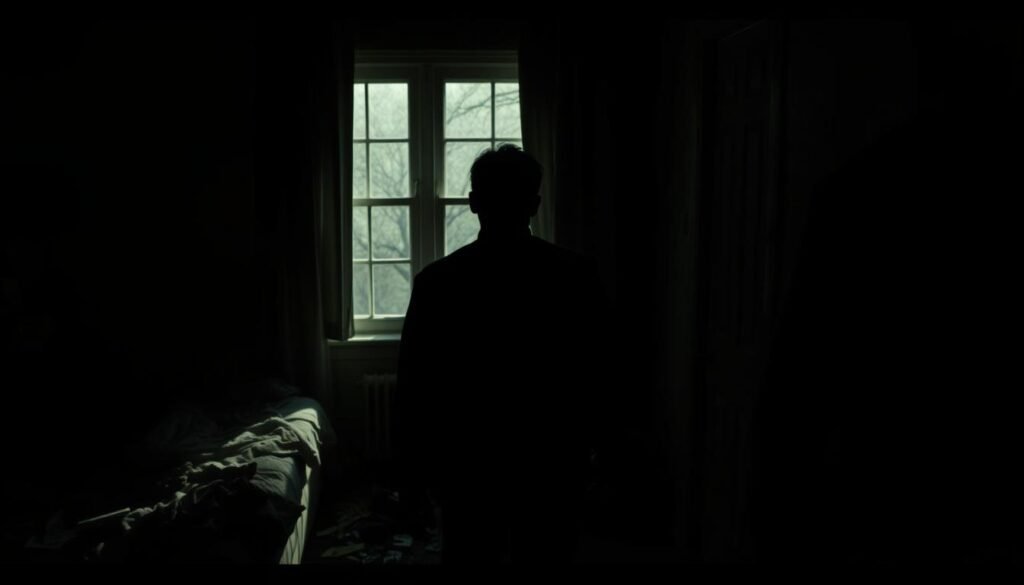Are you seeing signs of cheating in your relationship? Is your partner acting suspiciously, making you doubt their loyalty? If you think your partner might be cheating, it’s key to listen to your gut and look for signs.
Research shows that 20-33% of internet users cheat online. This makes it important to spot the warning signs. If your partner is suddenly secretive with their phone, spends a lot of time on social media, or takes their device everywhere, it’s a red flag. Ramani Durvasula, Ph.D., says cheaters often keep their activities hidden, only sharing what they need to.
Other signs include password-protected phones, private social media accounts, and clearing chat history. Susan Trombetti, CEO of Exclusive Matchmaking, points out that a sudden change in how they look or groom themselves could mean they’re cheating. They might be trying to impress someone new.
If your partner gets too excited about someone new or spends less time with you, it’s a warning sign. David Klow, a licensed family therapist, says a change in how they handle money, like not wanting to make big purchases together, could also indicate trouble.
Remember, suspecting cheating is a big deal. It’s crucial to be clear-headed and have evidence. Trust your instincts, as they can be a strong indicator of cheating in your relationship.
Signs Your Partner Might Be Cheating
When your partner becomes distant and secretive, it worries you. Not all changes mean they’re cheating, but some signs are red flags. Knowing these signs helps you talk about your relationship and check if your worries are right.
Sudden Changes in Behavior and Routine
A big change in your partner’s daily life could mean trouble. If they work late, go out more, or can’t be reached, it’s a sign. Look for any big changes that don’t make sense or seem out of character.
Increased Secrecy and Hiding Phone or Computer
Cheaters often hide their phones and computers. If your partner hides their phone, deletes texts, or quickly closes browsers, it’s a warning sign. Also, if they’re always with their phone or get defensive about it, that’s a red flag too.
| Behavior | Potential Sign of Cheating |
|---|---|
| Hiding phone or computer | Yes |
| Deleting text messages | Yes |
| Quickly closing browser windows | Yes |
Unexplained Absences and Excuses
If your partner keeps disappearing or gives vague reasons, it might mean they’re cheating. Cheaters often need alone time, leading to unexplained absences and weak excuses. If their stories don’t add up or keep changing, it’s time to talk.
These signs don’t prove cheating, but they hint at problems. By watching closely and talking openly, you can fix issues and strengthen your bond.
Emotional Distance and Lack of Intimacy
When a partner cheats, it can change how you feel about each other. You might notice you’re not as close as before. Feeling distant or less affectionate could mean something’s wrong.
Decreased Communication and Affection
Less talking and showing love are big signs of distance. If your partner talks less or shows less affection, it’s a warning. Also, if you’re not as physically close as before, it might mean they’re focusing on someone else.
Here are some interesting facts:
- Couples with cheating issues often struggle because the cheater doesn’t get how their actions hurt. This hurts the emotional bond.
- The hurt partner keeps talking about the betrayal until they feel heard. This shows a lack of emotional closeness and understanding.
- When the cheater won’t talk about their actions, the hurt partner feels unloved and unvalued.
Avoiding Spending Time Together
Another sign is when your partner doesn’t want to spend time with you. If they always have excuses or choose other things over you, it shows they’re not invested. Notice if you’re doing things together less often.
| Sign of Emotional Distance | Possible Reasons |
|---|---|
| Decreased communication | Emotional dissatisfaction, communication breakdown |
| Lack of physical affection | Lack of intimacy, unmet needs |
| Avoiding quality time together | Escape from relationship issues, attraction to someone else |
Emotional cheating can hurt just as much as physical cheating. If you think your partner is emotionally distant because of cheating, talk about it. Look for couples counseling to help rebuild trust and closeness.
Suspicious Online and Social Media Activity
In today’s world, suspicious online activity and secret social media accounts can hint at cheating. If your partner spends too much time online, hides their screen, or guards their phone closely, it’s a red flag.
A survey by the American Academy of Matrimonial Lawyers found that 81% of divorce attorneys have seen an increase in cases using social networking evidence over the past five years. This shows how social media is affecting relationships and leading to online cheating.
Secret Social Media Accounts or Profiles
Look out for secret social media profiles. If your partner has accounts you don’t know about or talks to unknown followers, it might mean they’re looking for attention elsewhere. Watch for unexplained followers, posts that vanish, and secretive behavior.
Excessive Time Spent Online
Too much time on social media, especially Instagram, could be a problem. If your partner talks to exes or new people online and gets defensive about it, that’s a warning sign. Also, be cautious of disappearing messages, which can hide secret chats.
Hiding Online Conversations and Interactions
Deleting messages, clearing history, and hiding screens are signs of hiding online talks. If your partner is secretive about their phone, changes passwords often, or gets messages from unknown numbers at odd times, trust your gut. It’s time to talk openly.
| Warning Sign | Potential Implication |
|---|---|
| Secret social media accounts | Seeking attention or validation outside the relationship |
| Excessive time spent online | Engaging in private conversations with exes or potential interests |
| Hiding online conversations | Concealing secretive communication and interactions |
While these signs might suggest cheating, it’s important to stay open-minded and talk things through with your partner. Getting advice from a trusted friend, family member, or professional can help you through this tough time.
Changes in Appearance and Grooming Habits
If your partner suddenly starts paying more attention to their looks and grooming habits, it might mean they’re cheating. They might buy new clothes, wear cologne, or change their hairstyle without a good reason. This could make you wonder why they’re making these appearance changes.
Seeing unexplained expenses on your credit card, like hotel or dinner charges, could be a sign of cheating. If they ignore important dates like anniversaries or birthdays, it might mean they’re not fully invested in your relationship.
Changes in how they talk to you can also be a warning sign. If they don’t want to share their day or seem uninterested in yours, it could mean something’s wrong. If they’re secretive about their phone or computer, it might suggest they’re hiding something.
| Infidelity Statistics | Percentage |
|---|---|
| Unmarried couples experiencing sexual infidelity | 30-40% |
| Married couples experiencing sexual infidelity | 18-20% |
Infidelity rates might go up with age, especially for women. It’s also more common in newer marriages than in the past. Seeing these changes in behavior could mean cheating, but it’s key to talk openly and not jump to conclusions without proof.
Wondering if your Partner is Cheating?
When you think your partner might be cheating, trust your instincts. Look for signs that something’s not right. Your gut feeling can pick up on clues that others might miss.
Trust Your Instincts and Intuition
A feeling that something’s off in your relationship is often right. Studies show 15-20% of people cheat. But, it’s hard to know for sure because people don’t always tell the truth.
Look for Patterns and Multiple Signs
Instead of focusing on one thing, look for patterns. Some signs include:
- Sudden changes in behavior and routine
- Increased secrecy and hiding phone or computer
- Unexplained absences and excuses
- Emotional distance and lack of intimacy
- Suspicious online and social media activity
Cheaters might act strangely online or pull away emotionally. They might not share their feelings as much.
| Behavior | Percentage |
|---|---|
| Decrease in sex frequency at home | 65% |
| Sudden increase in gift-giving | 40% |
| Unexplained money issues or large purchases | 55% |
Communicate Openly with Your Partner
Talking openly about relationship issues is key. It helps couples work through problems. Start the conversation calmly and share any evidence you have. Be ready for your partner to deny or defend themselves.
But, don’t let worries about cheating ruin your life. If you’re wrong, it might show your own fears. Getting help from a counselor can help you both trust each other again.
How to Confront a Cheating Partner
Talking to a cheating partner is tough and emotional. It’s key to be clear-headed and have a plan. Before you talk, gather proof and get ready mentally.
When you’re ready, pick a quiet spot for a private talk. Show any evidence calmly and clearly. Ask questions and watch how your partner reacts. This can tell you a lot about what really happened.
Choose the Right Time and Place
Finding the right time and place to talk is important. Pick a spot where you can talk openly without interruptions. Try to pick a time when you both are calm and not busy with other things.
Present Evidence Calmly and Clearly
When showing evidence of cheating, stay calm. Organize your thoughts and evidence well. Don’t accuse or argue. Just present the facts and let your partner speak.
Studies show that 25% of couples go to counseling if they suspect cheating. About 60% notice changes in their partner’s behavior. And 40% use phone tracking to gather evidence.
Be Prepared for Denial or Defensiveness
It’s common for a cheating partner to deny or get defensive. Around 70% of people deny cheating at first. Be ready for this and remember, lies are hard to keep up.
If your partner denies cheating despite evidence, stay firm. Don’t get into arguments or let them blame you. If they still deny it, you might need to get help or think about the relationship.
Dealing with a cheating partner is hard. But by choosing the right time, presenting evidence well, and being ready for denial, you can handle it better.
Rebuilding Trust After Infidelity
Rebuilding trust after infidelity is tough but possible. It takes commitment, patience, and a willingness to face the pain and issues that caused the betrayal. Many couples have overcome this and come out stronger.
A counselor with 27 years of experience says 20% to 40% of marriages face infidelity. But, with effort, many couples can regain trust and intimacy. In fact, about 31% of marriages not only survive but grow stronger after infidelity, with 75% reporting a deeper emotional bond.
Seek Counseling or Therapy
Seeking infidelity counseling or therapy is a great first step. A professional can help both partners share their feelings, work through pain, and find ways to move forward. Studies show that couples counseling can boost relationship satisfaction for 70% of couples after infidelity.
Establish Boundaries and Expectations
Setting clear boundaries and expectations is key to rebuilding trust. The partner who cheated must take full responsibility, be open, and show constant commitment. This might mean cutting ties with the affair partner, revealing any lies, and joining a recovery group or creating new safety rituals.
Ultimately, the choice to stay after infidelity is the betrayed partner’s in 60% of cases. It’s important to give them time and space to heal without pressure. Rebuilding trust means accepting the risk of getting hurt again but focusing on the potential for a deeper connection with your partner.
Moving Forward: Healing and Self-Care
Healing after cheating is tough and emotional. But, taking care of yourself is key to moving on. Whether you stay or leave, your well-being should be your main focus.
Having a supportive network of friends, family, and therapists is important. Doing things that make you happy, like yoga or walking, helps you feel better. It also helps you regain confidence and heal emotionally.
Seeing a therapist can give you valuable advice and strategies. It’s a safe place to deal with your feelings. Support groups for those who’ve been cheated on offer a sense of community and understanding.
| Healing Strategy | Benefits |
|---|---|
| Supportive Network | Provides emotional support and guidance |
| Engaging in Enjoyable Activities | Promotes self-care and rebuilds self-confidence |
| Professional Therapy | Offers insights, coping strategies, and a safe space |
| Support Groups | Provides a sense of community and understanding |
Don’t forget about your physical health. It affects your emotional well-being. Eat well and exercise regularly. Trust in your strength and know you deserve love and respect in your relationships.
Moving forward after infidelity is a personal journey. With time, kindness to yourself, and a focus on your well-being, you’ll grow stronger. Embrace self-care and positivity as you move through this chapter of your life.
Conclusion
Thinking your partner might be cheating is very hard and emotional. It’s important to look for patterns and signs, not just one thing. Trust your gut and watch for sudden changes, secrets, and feeling distant.
If you want to check, tools like mSpy can help secretly. But remember, talking openly is crucial in any relationship. If you can, talk to your partner about your worries calmly.
But, be ready for them to deny it or get defensive. If you both want to work on it, therapy can help. It’s good for rebuilding trust and setting clear boundaries.
Always put your own well-being first. Have friends and family around you for support. If you need more help, don’t hesitate to ask for it. You deserve a relationship based on trust, respect, and honesty.
If your partner has been unfaithful, you can still move forward. You have the power to make choices that are best for you. Remember, you’re not alone, and there’s always hope for healing and happiness.
Going through a tough time in a relationship is hard, but you can get through it. Trust yourself, take care of yourself, and seek help when you need it. You can find happiness, whether it’s in fixing your current relationship or starting a new one.


